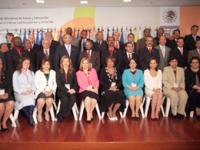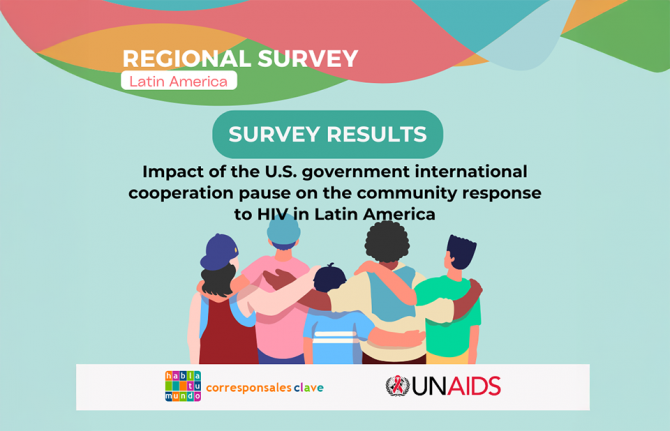
Feature Story
Preventing HIV through education in Latin America and Caribbean
31 July 2009
31 July 2009 31 July 2009
Ministers of Education and Health in Latin America and the Caribbean and other officials during the First Meeting of Ministers of Health and Education to stop HIV/AIDS in Latin America and the Caribbean. Mexico City, 1 August 2008.
Photo credit: agencialibrefoto
A year ago Latin America and the Caribbean Ministers pledged to provide comprehensive sex education in schools. The historic Prevention through education declaration was signed at the end of the First Meeting of Ministers of Education and Health to prevent HIV in Latin America and the Caribbean.
The Ministers committed to promoting concrete actions for HIV prevention among young people in their countries by implementing sex education and sexual health promotion programmes.
Effective sexuality education can provide young people with age-appropriate, accurate and sensitive information equipping them to make informed decisions. Governments in Latin America and Caribbean are showing increasing leadership in this area.
Dr César Nunez, UNAIDS Regional Director for Latin America
The declaration noted that “Sexuality is an essential part of being human and it is expressed throughout ones lifetime. Childhood and adolescence are important periods for the development of people and their countries, and for this reason, it is necessary to provide quality education that includes comprehensive education on sexuality both as a human right, as well as one that contributes to present and future quality of life.”
The Ministers also committed to two specific targets:
- By the year 2015, we will have reduced by 75% the number of schools that do not provide comprehensive sexuality education, of schools administered by the Ministries of Education.
- By the year 2015, we will reduce by 50% the number of adolescents and young people who are not covered by health services that appropriately attend to their sexual and reproductive health needs.
The 1 August meeting took place in Mexico City and was co-hosted by Dr José Ángel Córdova Villalobos (México), Minister of Health and Lic. Josefina Vázquez Mota (Mexico), Minister of Public Education in collaboration with Canciller Patricia Espinosa Cantellano (México), Minister of Foreign Affairs.
The event led to renewed commitment to education to prevent HIV in both Latin America and the Caribbean regions. Thanks to the declaration a new agreement was signed earlier this year in San Jose by the Government of Costa Rica which will lead in the sharing of sexual health information among young people, aged 15 – 25 years in two provinces. The young leaders will provide education on a wide range of issues such as modes of HIV transmission and how to use a condom.
Dr César Nunez, UNAIDS Regional Director for Latin America, points out that young people aged 15-24 accounted for 45% of all new HIV infections in 2007, however only 40% of young people aged 15-24 had accurate knowledge about HIV and transmission.
“Effective sexuality education can provide young people with age-appropriate, accurate and sensitive information equipping them to make informed decisions. Governments in Latin America and Caribbean are showing increasing leadership in this area.”
Preventing HIV through education in Latin America
Feature stories:
Costa Rica: Peer HIV prevention programmes to be promoted for young people (03 March 2009)
Leaders pledge to promote sexual health to stop HIV in Latin America and the Caribbean (03 August 2008)
Publications:
Ministerial Declaration: Preventing through education (en | es) (pdf, 112 Kb.| 91.5 Kb.)
Impact of HIV and sexual health education on sexual behaviour of young people: a review update (UNAIDS) (pdf, 736 Kb.)
Preventing HIV/AIDS in young People: A systematic review of the evidence from developing countries UNAIDS Inter-agency Task Team on Young People (UNAIDS Inter-agency Task Team on Young People, 2006) (pdf, 2.54 Mb.)



